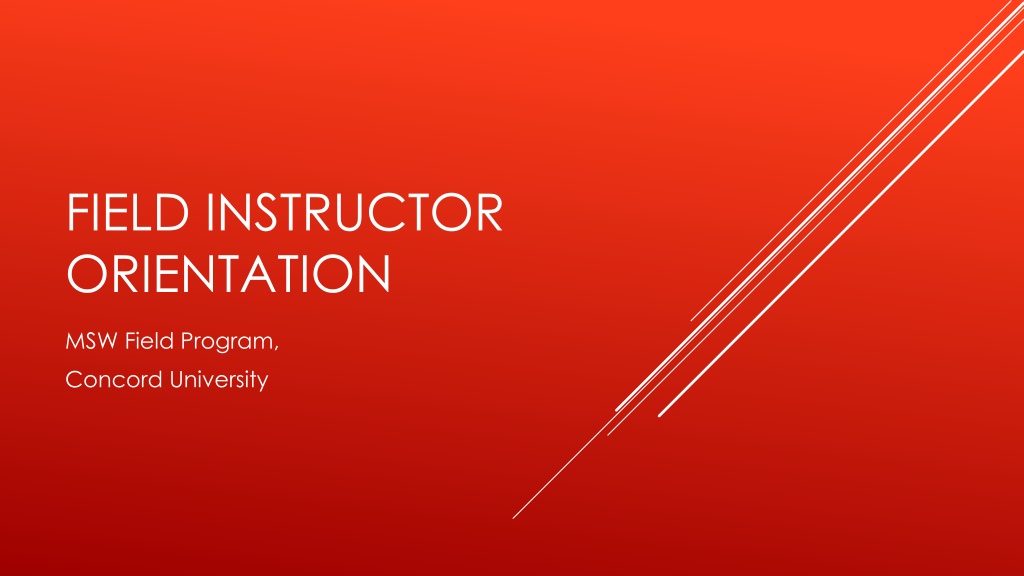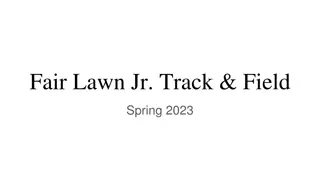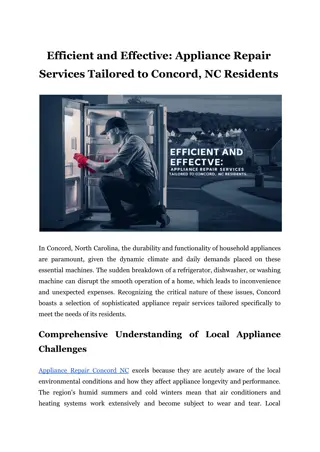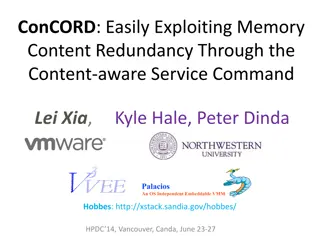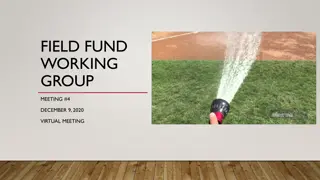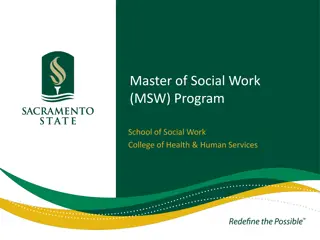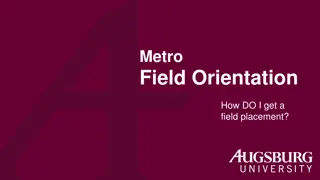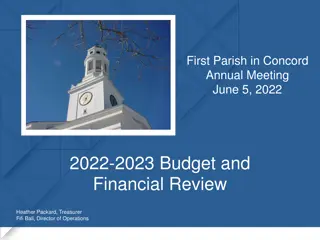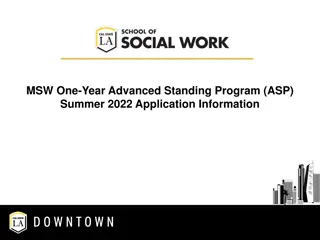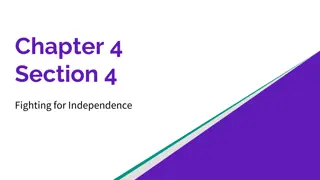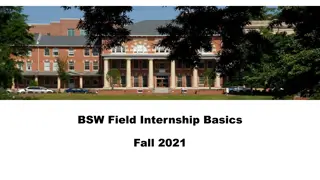Concord University MSW Field Program Overview
Concord University's MSW Field Program focuses on preparing students to conduct advanced social work practice with a rural concentration. Students will demonstrate the ability to engage, assess, intervene, and evaluate diverse rural contexts at all levels of practice. The program emphasizes critical thinking, ethical communication, reflective practice, and advocacy for social justice in rural settings.
Download Presentation

Please find below an Image/Link to download the presentation.
The content on the website is provided AS IS for your information and personal use only. It may not be sold, licensed, or shared on other websites without obtaining consent from the author.If you encounter any issues during the download, it is possible that the publisher has removed the file from their server.
You are allowed to download the files provided on this website for personal or commercial use, subject to the condition that they are used lawfully. All files are the property of their respective owners.
The content on the website is provided AS IS for your information and personal use only. It may not be sold, licensed, or shared on other websites without obtaining consent from the author.
E N D
Presentation Transcript
FIELD INSTRUCTOR ORIENTATION MSW Field Program, Concord University
Concord Social Work Program Goals Field Education as the Signature Pedagogy Core Competencies Roles in Field Overview: SOWK: 560 Generalist Field Practicum OVERVIEW
Students will demonstrate the ability to: Conduct advanced social work practice, with a rural concentration, which operates from a systems and strengths perspective with the ability to respond to varying rural contexts, including diversity and difference and to engage, assess, intervene, and evaluate at all levels including individuals, families, groups, organizations, and communities. Think critically and examine issues within the rural context while applying knowledge from both a person in environment and human behavior perspective to determine appropriate methods of intervention and to communicate these in an ethical manner utilizing the strengths of rural settings. CONCORD SOCIAL WORK PROGRAM GOALS
Utilize an advanced reflective and developmental approach to practice. Apply an advanced critical and analytical approach to practice that incorporates the unique culture and systems within rural settings and includes engaging in research-informed practice and practice- informed research. CONCORD SOCIAL WORK PROGRAM GOALS
Use advanced knowledge and skills in analyzing rural social policies and promoting change in rural settings through the development of more just and humane policies as they affect clients, social workers, and service systems. Address the uniqueness of issues of human rights, mechanisms of oppression, discrimination, and social and economic justice in order to improve the social and economic well-being of clients within rural settings across all levels of practice. CONCORD SOCIAL WORK PROGRAM GOALS
FIELD EDUCATION AS THE SIGNATURE PEDAGOGY
Signature pedagogy represents the central form of instruction and learning in which a profession socializes its students to perform the role of practitioner. In social work, the signature pedagogy is field education. The intent of field education is to connect the theoretical and conceptual contribution of the classroom with the practical world of the practice setting. The curriculum of the Masters of Social Work Program is designed to prepare social workers that are able to demonstrate competence in advanced generalist social work practice methods. FIELD EDUCATION AS THE SIGNATURE PEDAGOGY
CORE COMPETENCIES OF FIELD EDUCATION
The Core Competencies of Field Education are how students are assessed to measure learning in the field practicum. The Core Competencies can be found in the MSW Field Manual. CORE COMPETENCIES OF FIELD EDUCATION
The Field Director is the Social Work Faculty member designated to oversee activities associated with the field program. These activities include: Reviews all applications for field placements and requests for changes in placement; determines student eligibility for field practicum. Arranges student interviews with potential placement sites and provides the Field Instructor with necessary information about the student coming to the placement site. Approves student field placements Approves student registration for Concord University Field Practicum course. Provides Faculty Liaison with necessary information about student under Liaison s supervision. Monitors the Field program to ensure it meets the standards set forth by the Council of Social Work Education. Works with the Program Chair and Faculty Liaisons to resolve any deficits and implement any needed improvements in the Field program. Provides training and orientation to Field Instructors. Updates forms, the Field Manual, agency listings and agency agreements; maintains all records related to field. ROLES IN FIELD: FIELD DIRECTOR
The Faculty Liaison is the social work faculty member who teaches the sections of field. Responsibilities include: Arranges to meet with the student and supervisory personnel in the agency during the first two weeks of the semester to review and discuss the draft of the Learning Contract the student and Field Instructor have developed. Suggestions for any revisions or amendments are made at that time. Maintains blackboard site where students submit weekly logs and assignments. Arranges Adobe connect sessions (if applicable). Responds to agency/student inquiries. Assigns a final grade for the student. Reports to the Field Director suggestions and recommendations from agency personnel and students concerning the placement experience. ROLES IN FIELD: FACULTY LIAISON
The Field Instructor is the agency employee formally assigned to supervise and instruct the student during the Field Placement. Field Instructor Criteria: Must have an MSW Two years social work practice experience If placement is employer based the Field Instructor should be someone who is NOT the student s job supervisor Exceptions to these can sometimes be made do to lack of availability of someone that meets all criteria Field Instructor Responsibilities: Negotiate student s Learning Contract Critique and discussion of student s assignments Complete evaluations of the student s progress/of the field program Ideally, the Field Instructor will set aside one hour per week of uninterrupted time for supervising the student. ROLES IN FIELD: FIELD INSTRUCTOR
The agency Field Instructor plays the single most critical role in a successful Field Placement and often leaves a life-long impression on the new social worker. The student often models his/her role of practitioner from observations of the Field Instructor. Think back to your own field placement Where were you placed? Who was your field instructor? What was the experience like? Do you still have traits and methods of practice that you were taught then that you still use today? ROLES IN FIELD: FIELD INSTRUCTOR
An agency employee other than the Field Instructor who supervises the student s performance and fosters the student s learning. Frequently, a task supervisor is used when the student intern is assigned to agency programs outside the Field Instructor s direct purview. Recognizing how busy most Field Instructors are, some of the weekly supervision may be done by a Task Supervisor. ROLES IN FIELD: TASK SUPERVISOR
Provide space and adequate/appropriate working conditions. Provide orientation regarding: Purpose and function of the agency Community and population the agency serves The practice area or population and types of issues in which the agency deals The major methods of intervention utilized by the agency Field Instructor, Faculty Liaison, and the student in placement will negotiate a contract which will delineate the objectives and goals of the field placement. ROLES IN FIELD: COMMITMENT OF FIELD INSTRUCTORS AND FIELD AGENCIES
Provide a written evaluation of the student at mid-term and at the conclusion of the placement. Assign appropriate tasks to the student, with a gradual increase in complexity and responsibility and provide a broad range of agency experiences. Provide opportunity to participate in staff meetings, conduct research, attend agency conferences, and staff meetings. Provide guided reading related to social work practice issues faced by the host agency. ROLES IN FIELD: COMMITMENT OF FIELD INSTRUCTORS AND FIELD AGENCIES
Provide reimbursement of expenses incurred by the student in the course of performing agency services. Be available for conferences and provide access to information needed by the student to perform assigned tasks. Maintain ongoing communication with the assigned Faculty Liaison. ROLES IN FIELD: COMMITMENT OF FIELD INSTRUCTORS AND FIELD AGENCIES
OVERVIEW: SOWK. 560 GENERALIST FIELD PRACTICUM
The generalist field experience provides an opportunity to apply the skills, knowledge, and values of generalist social work practice in a social service setting with diverse clients. Generalist students are required to have completed 400 hours of field instruction before proceeding to the Advanced Field Practicum. The Generalist Field Practicum hours are earned at the rate of 20 hours per week, across two semesters. Usually this is a Spring Semester and First Summer Term, but can differ. Students can NOT bank hours to finish field early. The 400 hours is the absolute MINIMUM hours for the entire placement. Students are expected to be in field for the 20 hours a week for everyone week that classes are in session across the two semesters. OVERVIEW: SOWK 560 GENERALIST FIELD PRACTICUM
Students who enroll in SOWK 560, Generalist Field Practicum will meet the following criteria: Formal admission to the Master of Social Work Program at Concord University Successful completion of SOWK 501 (Intro to Generalist Practice) and SOWK 511 (Generalist Human Behavior and the Social Environment) before starting the practicum Concurrent enrollment or completion of SOWK 531 (Generalist Practice) Submit an application for the Field Practicum to Field Director by due date (see below) Consent of the Field Director OVERVIEW: SOWK 560 GENERALIST FIELD PRACTICUM
Terri Philpott PHD. Candidate, MSW, ACSW, LCSW Instructor/Director of Field Education Office A104B, Marsh Hall (Admin. Building) Phone: 304-384-5282 Email: tphilpott@concord.edu CONTACT INFORMATION
